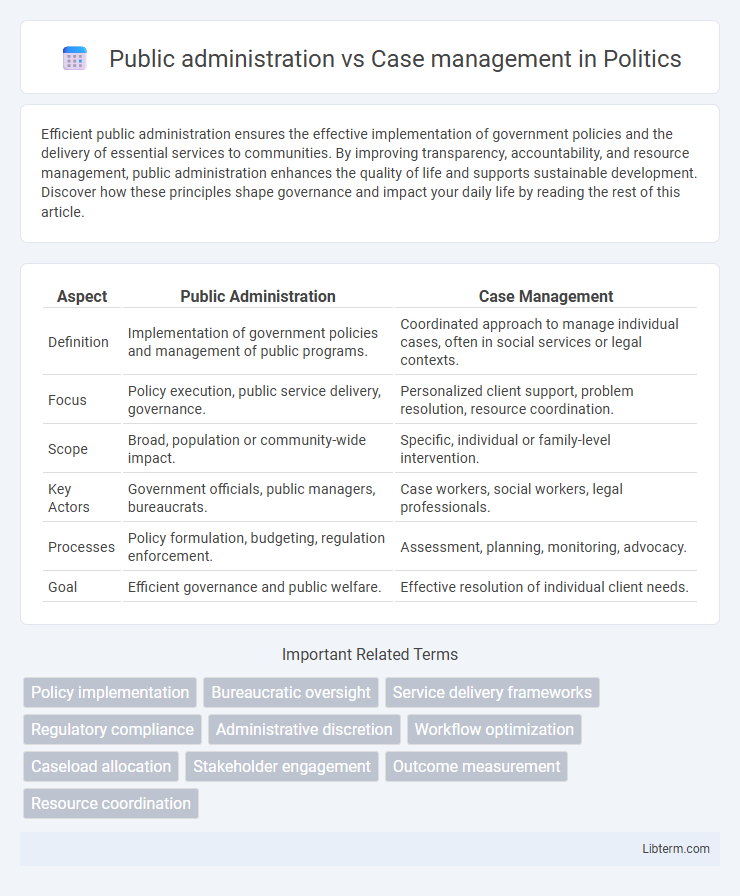Efficient public administration ensures the effective implementation of government policies and the delivery of essential services to communities. By improving transparency, accountability, and resource management, public administration enhances the quality of life and supports sustainable development. Discover how these principles shape governance and impact your daily life by reading the rest of this article.
Table of Comparison
| Aspect | Public Administration | Case Management |
|---|---|---|
| Definition | Implementation of government policies and management of public programs. | Coordinated approach to manage individual cases, often in social services or legal contexts. |
| Focus | Policy execution, public service delivery, governance. | Personalized client support, problem resolution, resource coordination. |
| Scope | Broad, population or community-wide impact. | Specific, individual or family-level intervention. |
| Key Actors | Government officials, public managers, bureaucrats. | Case workers, social workers, legal professionals. |
| Processes | Policy formulation, budgeting, regulation enforcement. | Assessment, planning, monitoring, advocacy. |
| Goal | Efficient governance and public welfare. | Effective resolution of individual client needs. |
Introduction to Public Administration and Case Management
Public administration involves the implementation of government policies and the management of public programs to serve the community effectively. Case management focuses on coordinating individualized services and resources to address specific client needs, often within social work or healthcare settings. Both fields emphasize organized planning and efficient resource allocation but differ in scope, with public administration targeting broader policy execution and case management concentrating on personalized client support.
Defining Public Administration: Scope and Functions
Public administration encompasses the implementation of government policies, management of public programs, and coordination of resources to serve the public interest. It involves policy formulation, organizational management, budgeting, and regulation enforcement, aiming to achieve societal welfare and public accountability. In contrast, case management focuses on personalized coordination of services for individuals, emphasizing assessment, planning, and advocacy within specific client needs.
Understanding Case Management: Key Concepts
Case management involves coordinating services to meet individual client needs, emphasizing personalized planning, advocacy, and resource allocation. It integrates assessment, planning, implementation, and evaluation to improve client outcomes within social work, healthcare, and legal contexts. Public administration, by contrast, focuses on broader policy implementation and organizational management at the government or institutional level.
Core Objectives: Public Administration vs Case Management
Public administration focuses on the effective implementation of government policies, ensuring public resources are managed efficiently to serve the community's broad needs. Case management centers on personalized client services, coordinating resources and interventions to address individual needs and improve outcomes. Core objectives in public administration emphasize governance and policy execution, while case management prioritizes tailored support and client advocacy.
Roles and Responsibilities in Each Discipline
Public administration involves managing public programs, implementing government policies, and overseeing public sector operations to serve the community effectively, with roles including policy development, budget management, and regulatory compliance. Case management focuses on individualized client support, coordinating services such as healthcare, social services, or legal assistance, emphasizing assessment, planning, and monitoring to meet specific client needs. Key responsibilities in public administration center on organizational leadership and resource allocation, while case management prioritizes direct client interaction and personalized service coordination.
Skill Sets Required for Public Administration and Case Management
Public administration demands strong skills in policy analysis, organizational management, and public finance to efficiently manage government operations and resources. Case management requires expertise in client assessment, crisis intervention, and resource coordination to effectively support individuals and families in need. Both fields benefit from communication, problem-solving, and ethical decision-making, yet public administration emphasizes macro-level strategies while case management focuses on micro-level client interaction.
Organizational Structures and Workflow Comparisons
Public administration emphasizes hierarchical organizational structures with clearly defined roles and standardized workflows to ensure policy implementation and service delivery across government entities. Case management utilizes more flexible, client-centered workflows that adapt to individual case needs, often involving cross-functional teams and real-time coordination among service providers. While public administration prioritizes broad organizational efficiency and accountability, case management focuses on personalized service delivery and dynamic case progression tracking.
Challenges Faced in Public Administration and Case Management
Public administration faces challenges such as bureaucratic inefficiencies, budget constraints, and policy implementation gaps that hinder effective governance. Case management encounters obstacles including coordinating diverse service providers, managing complex client needs, and ensuring timely follow-ups. Both fields require robust communication systems and adaptive strategies to overcome organizational and resource limitations.
Impact on Service Delivery and Public Welfare
Public administration streamlines policy implementation and resource allocation, significantly enhancing the efficiency and reach of public services, which directly improves community welfare. Case management provides personalized support by coordinating individual client services, ensuring targeted interventions that address specific needs, thereby promoting better outcomes in social and healthcare sectors. Together, these approaches optimize service delivery by combining systemic oversight with tailored care, maximizing public welfare impact.
Future Trends and Opportunities in Both Fields
Public administration is evolving with the integration of artificial intelligence and big data analytics, enhancing policy-making efficiency and public service delivery. Case management is increasingly adopting digital platforms and predictive analytics to streamline client tracking and improve outcome accuracy. Both fields present opportunities for automation, cross-sector collaboration, and enhanced resource optimization to address complex societal challenges.
Public administration Infographic

 libterm.com
libterm.com